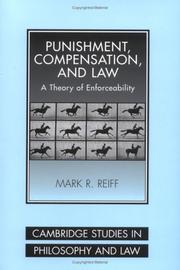| Listing 1 - 10 of 57 | << page >> |
Sort by
|

ISBN: 9780511130496 051113049X 9786610416066 6610416060 0511128967 9780511128967 0521846692 110715247X 1280416068 0511182260 0511199651 0511300220 0511499248 0521174236 9780521846691 Year: 2005 Publisher: Cambridge : Cambridge University Press,
Abstract | Keywords | Export | Availability | Bookmark
 Loading...
Loading...Choose an application
- Reference Manager
- EndNote
- RefWorks (Direct export to RefWorks)
When it was originally published in 2005, this book was the first comprehensive study of the meaning and measure of enforceability. While we have long debated what restraints should govern the conduct of our social life, we have paid relatively little attention to the question of what it means to make a restraint enforceable. Focusing on the enforceability of legal rights but also addressing the enforceability of moral rights and social conventions, Mark Reiff explains how we use punishment and compensation to make restraints operative in the world. After describing the various means by which restraints may be enforced, Reiff explains how the sufficiency of enforcement can be measured, and he presents a unified theory of deterrence, retribution, and compensation that shows how these aspects of enforceability are interconnected. Reiff then applies his theory of enforceability to illuminate a variety of real-world problem situations.
Obedience (Law) --- Law enforcement. --- Punishment --- Compensation (Law) --- Law --- Enforcement of law --- Criminal justice, Administration of --- Legal obligation --- Obligation, Legal --- Obligation to obey the law --- Philosophy. --- Philosophy --- Policing --- Arts and Humanities

ISBN: 1107132347 1280418435 0511178131 1139147714 0511073933 0511073755 0511305451 051161389X 0511073836 9780511073939 9780511073755 9780511073830 9780521810470 0521810477 0521008727 9780521008723 9780511613890 9781280418433 Year: 2002 Publisher: Cambridge : Cambridge University Press,
Abstract | Keywords | Export | Availability | Bookmark
 Loading...
Loading...Choose an application
- Reference Manager
- EndNote
- RefWorks (Direct export to RefWorks)
Do citizens have an obligation to obey the law? This book differs from standard approaches by shifting from the language of obedience (orders) to that of deference (normative judgments). The popular view that law claims authority but does not have it is here reversed on both counts: law does not claim authority but has it. Though the focus is on political obligation, the author approaches that issue indirectly by first developing a more general account of when deference is due to the view of others. Two standard practices that political theorists often consider in exploring the question of political obligation - fair-play and promise-keeping - can themselves be seen as examples of a duty of deference. In this respect the book defends a more general theory of ethics whose scope extends beyond the question of political obligation to questions of duty in the case of law, promises, fair play and friendship.
Deference (Law) --- Law and ethics. --- Rule of law. --- Law --- Supremacy of law --- Administrative law --- Constitutional law --- Ethics and law --- Law and morals --- Morals and law --- Interpretation and construction --- Philosophy --- Obedience (Law) --- Legal obligation --- Obligation, Legal --- Obligation to obey the law --- Arts and Humanities --- DROIT --- DROIT NATUREL --- ETHIQUE --- RESPECT --- DEFERENCE --- DROIT ET MORALE --- PHILOSOPHIE
Book
ISBN: 0674065174 0674069390 9780674069398 9780674065178 9780674064416 0674064410 Year: 2012 Publisher: Cambridge, Mass. London Harvard University Press
Abstract | Keywords | Export | Availability | Bookmark
 Loading...
Loading...Choose an application
- Reference Manager
- EndNote
- RefWorks (Direct export to RefWorks)
Do citizens of a nation such as the United States have a moral duty to obey the law? Do officials, when interpreting the Constitution, have an obligation to follow what that text meant when ratified? To follow precedent? To follow what the Supreme Court today says the Constitution means?These are questions of political obligation (for citizens) and interpretive obligation (for anyone interpreting the Constitution, often officials). Abner Greene argues that such obligations do not exist. Although citizens should obey some laws entirely, and other laws in some instances, no one has put forth a successful argument that citizens should obey all laws all the time. Greene's case is not only "against" obligation. It is also "for" an approach he calls "permeable sovereignty": all of our norms are on equal footing with the state's laws. Accordingly, the state should accommodate religious, philosophical, family, or tribal norms whenever possible.Greene shows that questions of interpretive obligation share many qualities with those of political obligation. In rejecting the view that constitutional interpreters must follow either prior or higher sources of constitutional meaning, Greene confronts and turns aside arguments similar to those offered for a moral duty of citizens to obey the law.
Constitutional law --- Effectiveness and validity of law. --- Law --- Obedience (Law) --- Legal obligation --- Obligation, Legal --- Obligation to obey the law --- Acts, Legislative --- Enactments, Legislative --- Laws (Statutes) --- Legislative acts --- Legislative enactments --- Jurisprudence --- Legislation --- Validity and effectiveness of law --- International law --- Moral and ethical aspects. --- Philosophy --- Effectiveness and validity of law --- Moral and ethical aspects --- Law - Moral and ethical aspects --- Constitutional law - United States
Book
ISBN: 051185031X 1107211077 0511781261 128277123X 9786612771231 0511775911 0511776675 0511774095 0511773021 0511775156 9780511776670 9780511781261 9780511775154 9780521880657 0521880653 9780521706834 0521706831 6612771232 9780511774096 Year: 2010 Publisher: Cambridge : Cambridge University Press,
Abstract | Keywords | Export | Availability | Bookmark
 Loading...
Loading...Choose an application
- Reference Manager
- EndNote
- RefWorks (Direct export to RefWorks)
It has never been more important to understand how international law enables and constrains international politics. By drawing together the legal theory of Lon Fuller and the insights of constructivist international relations scholars, this book articulates a pragmatic view of how international obligation is created and maintained. First, legal norms can only arise in the context of social norms based on shared understandings. Second, internal features of law, or 'criteria of legality', are crucial to law's ability to promote adherence, to inspire 'fidelity'. Third, legal norms are built, maintained or destroyed through a continuing practice of legality. Through case studies of the climate change regime, the anti-torture norm, and the prohibition on the use of force, it is shown that these three elements produce a distinctive legal legitimacy and a sense of commitment among those to whom law is addressed.
International law --- Obedience (Law) --- Rule of law. --- Effectiveness and validity of law. --- Validity and effectiveness of law --- Jurisprudence --- Supremacy of law --- Administrative law --- Constitutional law --- Legal obligation --- Obligation, Legal --- Obligation to obey the law --- Law --- Law of nations --- Nations, Law of --- Public international law --- Social aspects. --- Psychological aspects. --- Philosophy --- General and Others
Book
ISBN: 8413777453 Year: 2021 Publisher: Madrid Universidad Carlos III de Madrid. Figuerola Institute of Social Science History
Abstract | Keywords | Export | Availability | Bookmark
 Loading...
Loading...Choose an application
- Reference Manager
- EndNote
- RefWorks (Direct export to RefWorks)
One of the main legal principles in ancient Greece was obedience to the law (nomos). Particularly, its importance is based on the fact that it was a central element for the shaping of a harmonious and powerful polis, in which citizens could flourish and lead a happy life. In addition, good legal order was so important that several sources reveal a strong rejection against any such person who, as tyrants, threatens the integrity of political institutions and prioritizes their own interests above anything else. In this regard, the author known as “Anonymous Iamblichus”, who is thought to have written in the age of the great Sophists, hypothesizes about the existence of a man of steel (adamantinos aner) to show that no one, no matter how extraordinary and powerful, could live outside the law, justice, and community. This book explores the ethical-political meaning of this argument with the intention of reflecting on the value of laws and their authority. Guided by a methodology that combines a philological analysis and a legal philosophy approach, it seeks to emphasize the richness of Anonymous Iamblichus' text to understand the development process of the supremacy of the law in the history of Athenian democracy. Uno de los principales principios jurídicos en el mundo griego antiguo era la obediencia a la ley (nómos). En especial, su importancia se explica porque constituía un elemento central para la conformación de una pólis armónica y poderosa, en la que los ciudadanos puedan desarrollarse y llevar a cabo una vida feliz. Además, el buen orden legal era tan importante que varias fuentes revelan un fuerte rechazo contra toda aquella figura que, como el tirano, atente contra la integridad de las instituciones políticas y priorice ante todo sus propios intereses. Al respecto, el autor conocido como el “Anónimo de Jámblico”, quien al parecer habría escrito en el período de los grandes sofistas, plantea como hipótesis la existencia de un hombre de acero (adamántinos anér) para demostrar que nadie, por más extraordinario y poderoso que sea, podría vivir al margen de la ley, la justicia y la comunidad. En este libro se explora el significado ético-político de tal argumento con el propósito de reflexionar acerca del valor de las leyes y su autoridad. Mediante una metodología que entrecruza el análisis filológico y un enfoque iusfilosófico, se busca acentuar la riqueza del texto del Anónimo para comprender el proceso de desarrollo de la supremacía del derecho en la historia de la democracia ateniense.
Obedience (Law) --- Philosophy, Ancient. --- Obediencia (Derecho) --- Filosofía antigua. --- Ancient philosophy --- Greek philosophy --- Philosophy, Greek --- Philosophy, Roman --- Roman philosophy --- Legal obligation --- Obligation, Legal --- Obligation to obey the law --- Law --- Philosophy --- History --- Athenian law --- Polis --- Obedience --- Democracy --- Anonymous Iamblichus --- Derecho ateniense --- Obediencia --- Democracia --- Anónimo de Jámblico
Book
ISBN: 9780674972469 0674972465 9780674971059 0674971051 Year: 2016 Publisher: Cambridge, Massachusetts
Abstract | Keywords | Export | Availability | Bookmark
 Loading...
Loading...Choose an application
- Reference Manager
- EndNote
- RefWorks (Direct export to RefWorks)
Laws and regulations are ubiquitous, touching on many aspects of individual and corporate behavior. But under what conditions are laws and rules actually effective? A huge amount of recent work in political science, sociology, economics, criminology, law, and psychology, among other disciplines, deals with this question. But these fields rarely inform one another, leaving the state of research disjointed and disorganized. Lawrence M. Friedman finds order in this cacophony. Impact gathers recent findings into one overarching analysis and lays the groundwork for a cohesive body of work in what Friedman labels “impact studies.” The first important factor that has a bearing on impact is communication. A rule or law has no effect if it never reaches its intended audience. The public’s fund of legal knowledge, the clarity of the law, and the presence of information brokers all influence the flow of information from lawmakers to citizens. After a law is communicated, subjects sometimes comply, sometimes resist, and sometimes adjust or evade. Three clusters of motives help shape which reaction will prevail: first, rewards and punishments; second, peer group influences; and third, issues of conscience, legitimacy, and morality. When all of these factors move in the same direction, law can have a powerful impact; when they conflict, the outcome is sometimes unpredictable.
Effectiveness and validity of law. --- Law --- Obedience (Law) --- Compliance. --- Sociological jurisprudence. --- Law and society --- Society and law --- Sociology of law --- Jurisprudence --- Sociology --- Law and the social sciences --- Compliant behavior --- Conformity --- Cooperativeness --- Psychology --- Legal obligation --- Obligation, Legal --- Obligation to obey the law --- Juridical psychology --- Juristic psychology --- Legal psychology --- Psychology, Juridical --- Psychology, Juristic --- Psychology, Legal --- Psychology, Applied --- Therapeutic jurisprudence --- Acts, Legislative --- Enactments, Legislative --- Laws (Statutes) --- Legislative acts --- Legislative enactments --- Legislation --- Validity and effectiveness of law --- International law --- Social aspects. --- Psychological aspects. --- Philosophy
Periodical
ISSN: 00101958 19452268 Publisher: New York (N.Y.) : Columbia University. School of law,
Abstract | Keywords | Export | Availability | Bookmark
 Loading...
Loading...Choose an application
- Reference Manager
- EndNote
- RefWorks (Direct export to RefWorks)
Founded in 1901, the Columbia Law Review is a leader in legal scholarship in the United States and around the world. The Review is an independent nonprofit corporation edited and published entirely by students at Columbia Law School. Published eight times a year, the Review is the third most widely distributed and cited law review in the country, receiving close to 1,500 submissions yearly from which approximately 25 manuscripts are chosen for publication.
Law --- Droit --- Periodicals --- Périodiques --- Jurisprudence --- Jurisprudence. --- Law. --- Recht. --- Arbitration, Education & Training --- General and Others --- General and Others. --- Périodiques --- EBSCOASP-E EBSCOBSP-E EJDROIT EJETUDE EPUB-ALPHA-C EPUB-PER-FT JSTOR-E --- Acts, Legislative --- Enactments, Legislative --- Laws (Statutes) --- Legislative acts --- Legislative enactments --- Legislation --- Constitutional Law --- Court Decision --- Legal Aspects --- Legal Obligations --- Legal Status --- State Interest --- Litigation --- Medical Jurisprudence --- Aspect, Legal --- Aspects, Legal --- Constitutional Laws --- Court Decisions --- Decision, Court --- Decisions, Court --- Interest, State --- Interests, State --- Jurisprudence, Medical --- Law, Constitutional --- Laws --- Laws, Constitutional --- Legal Aspect --- Legal Obligation --- Litigations --- Obligation, Legal --- Obligations, Legal --- State Interests --- Status, Legal --- Defamation --- Lawyers --- Regions --- Dret. --- Estats Units d'Amèrica.
Periodical
Abstract | Keywords | Export | Availability | Bookmark
 Loading...
Loading...Choose an application
- Reference Manager
- EndNote
- RefWorks (Direct export to RefWorks)
Forensic psychiatry --- Insanity --- Jurisprudence --- Psychiatry --- Insanity (Law) --- Jurisprudence. --- Psychiatry. --- Psychiatrie médico-légale --- Aliénation mentale --- Forensic psychiatry. --- Criminal insanity --- Lunacy (Law) --- Mental illness --- Mentally ill --- Psychiatrists --- Psychiatrist --- Constitutional Law --- Court Decision --- Law --- Legal Aspects --- Legal Obligations --- Legal Status --- State Interest --- Litigation --- Medical Jurisprudence --- Aspect, Legal --- Aspects, Legal --- Constitutional Laws --- Court Decisions --- Decision, Court --- Decisions, Court --- Interest, State --- Interests, State --- Jurisprudence, Medical --- Law, Constitutional --- Laws --- Laws, Constitutional --- Legal Aspect --- Legal Obligation --- Litigations --- Obligation, Legal --- Obligations, Legal --- State Interests --- Status, Legal --- Insanity (Jurisprudence) --- Law and legislation --- Legal status, laws, etc. --- Capacity and disability --- Insanity defense --- Medical jurisprudence --- Mentally ill offenders --- Defamation --- Lawyers --- Law, General & Comparative --- Insane
Periodical
ISSN: 23495014 24550094 Year: 2015 Publisher: [Mumbai, India] : Wolters Kluwer - Medknow,
Abstract | Keywords | Export | Availability | Bookmark
 Loading...
Loading...Choose an application
- Reference Manager
- EndNote
- RefWorks (Direct export to RefWorks)
forensic science --- forensic medicine --- Forensic sciences --- Medical jurisprudence --- Forensic Sciences. --- Forensic Science --- Science, Forensic --- Sciences, Forensic --- Forensic sciences. --- Medical jurisprudence. --- Forensic medicine --- Injuries (Law) --- Jurisprudence, Medical --- Legal medicine --- Medicine --- Medical laws and legislation --- Criminalistics --- Forensic science --- Science --- Criminal investigation --- Legal & Forensic Medicine --- Forensic Medicine. --- Medicine, Forensic --- Medicine, Legal --- Legal Medicine --- Jurisprudence --- Law Enforcement --- Biometric Identification --- DNA Contamination --- Human medicine --- Jurisprudence. --- Constitutional Law --- Court Decision --- Law --- Legal Aspects --- Legal Obligations --- Legal Status --- State Interest --- Litigation --- Medical Jurisprudence --- Aspect, Legal --- Aspects, Legal --- Constitutional Laws --- Court Decisions --- Decision, Court --- Decisions, Court --- Interest, State --- Interests, State --- Law, Constitutional --- Laws --- Laws, Constitutional --- Legal Aspect --- Legal Obligation --- Litigations --- Obligation, Legal --- Obligations, Legal --- State Interests --- Status, Legal --- Defamation --- Lawyers

ISBN: 1280167114 9786610167111 1843144352 1859415156 1859413226 Year: 2002 Publisher: London : Cavendish,
Abstract | Keywords | Export | Availability | Bookmark
 Loading...
Loading...Choose an application
- Reference Manager
- EndNote
- RefWorks (Direct export to RefWorks)
The Cavendish "LawCards" books cover the broad range of subjects available on the undergraduate law programme, as well as on the CPE/Diploma in Law course. Each one of the Cavendish LawCards is a complete, pocket-sized guide to key examinable areas of the.
Law - Great Britain --- Law - Non-U.S. --- Law, Politics & Government --- Law --- Criminal Law --- Crime --- Crimes and misdemeanors --- Criminals --- Law, Criminal --- Penal codes --- Penal law --- Pleas of the crown --- Public law --- Criminal justice, Administration of --- Criminal procedure --- Constitutional Law --- Court Decision --- Legal Aspects --- Legal Obligations --- Legal Status --- State Interest --- Litigation --- Medical Jurisprudence --- Aspect, Legal --- Aspects, Legal --- Constitutional Laws --- Court Decisions --- Decision, Court --- Decisions, Court --- Interest, State --- Interests, State --- Jurisprudence, Medical --- Law, Constitutional --- Laws --- Laws, Constitutional --- Legal Aspect --- Legal Obligation --- Litigations --- Obligation, Legal --- Obligations, Legal --- State Interests --- Status, Legal --- Defamation --- Lawyers --- Law and legislation --- Legal status, laws, etc.
| Listing 1 - 10 of 57 | << page >> |
Sort by
|

 Search
Search Feedback
Feedback About
About Help
Help News
News